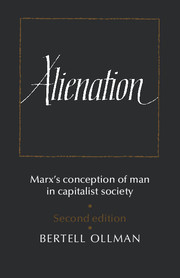Book contents
- Frontmatter
- Contents
- Preface to the second edition
- Note on translations
- Acknowledgements
- General introduction
- PART I PHILOSOPHICAL INTRODUCTION
- PART II MARX'S CONCEPTION OF HUMAN NATURE
- PART III THE THEORY OF ALIENATION
- 18 The theory of alienation
- 19 Man's relation to his productive activity
- 20 Man's relation to his product
- 21 Man's relation to his fellow men
- 22 Man's relation to his species
- 23 The capitalist's alienation
- 24 The division of labor and private property
- 25 The labor theory of value: labor-power
- 26 Value as alienated labor
- 27 The metamorphosis of value
- 28 The fetishism of commodities
- 29 Class as a value Relation
- 30 State as a value Relation
- 31 Religion as a value Relation
- 32 Marx's critique of bourgeois ideology
- PART IV CONCLUSION
- Appendix I In defense of the philosophy of internal relations
- Appendix II Response to my critics: more on internal relations
- Notes to the text
- Bibliography of works cited
- Index of names and ideas
- Cambridge Studies in the History and Theory of Politics
28 - The fetishism of commodities
Published online by Cambridge University Press: 05 June 2012
- Frontmatter
- Contents
- Preface to the second edition
- Note on translations
- Acknowledgements
- General introduction
- PART I PHILOSOPHICAL INTRODUCTION
- PART II MARX'S CONCEPTION OF HUMAN NATURE
- PART III THE THEORY OF ALIENATION
- 18 The theory of alienation
- 19 Man's relation to his productive activity
- 20 Man's relation to his product
- 21 Man's relation to his fellow men
- 22 Man's relation to his species
- 23 The capitalist's alienation
- 24 The division of labor and private property
- 25 The labor theory of value: labor-power
- 26 Value as alienated labor
- 27 The metamorphosis of value
- 28 The fetishism of commodities
- 29 Class as a value Relation
- 30 State as a value Relation
- 31 Religion as a value Relation
- 32 Marx's critique of bourgeois ideology
- PART IV CONCLUSION
- Appendix I In defense of the philosophy of internal relations
- Appendix II Response to my critics: more on internal relations
- Notes to the text
- Bibliography of works cited
- Index of names and ideas
- Cambridge Studies in the History and Theory of Politics
Summary
The ‘fetishism of commodities’ refers to people's misconception of the products of labor once they enter exchange, a misconception which accords these forms of value leading roles in what is still a human drama. The metamorphosis of value is a tale about man, his productive activity and products, and what happens to them all in capitalist society. Misreading this story as one about the activities of inanimate objects, attributing to them qualities which only human beings could possess, positing living relations for what is dead, is what Marx calls the ‘fetishism of commodities’.
According to Marx, ‘This fetishism of commodities has its origins … in the peculiar social character of the labor that produces them.’ This character, as we saw, is reproduced in the product, value. As the abstract product of alienated labor, value expresses the relations of the individuals engaged in such labor. However, though value contains human relations, it actually conveys them as relations between their products. Hence, the remark, ‘When, therefore, Galiani says: Value is a relation between persons … he ought to have added: a relation between persons expressed as a relation between things’.
For Marx, it is through the monetary expression of exchange value that the ties between people at work have remained so carefully hidden. He maintains that it is
this ultimate money-form of the world of commodities that actually conceals, instead of disclosing the social character of private labor, and the social relations between the individual producers. […]
- Type
- Chapter
- Information
- AlienationMarx's Conception of Man in a Capitalist Society, pp. 195 - 201Publisher: Cambridge University PressPrint publication year: 1977



